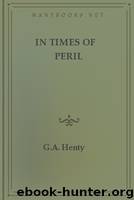In Times of Peril by G.A. Henty

Author:G.A. Henty
Language: eng
Format: epub
* * *
CHAPTER XIII.
LUCKNOW.
Lucknow, although the capital of Oude, the center of a warlike people smarting under recent annexation, had for a long time remained tranquil after insurrection and massacre were raging unchecked in the northwest. Sir Henry Lawrence, a man of great decision and firmness united to pleasant and conciliating manners, had, when the Sepoys began to hold nightly meetings and to exhibit signs of recklessness, toward the end of April, telegraphed to government for full power to act; and having obtained the required authorization, he awaited with calmness the first sign of insubordination. This was exhibited by the men of the Seventh Oude Irregular Infantry, who on the 3d of May endeavored to seduce the men of the Forty-eighth Native Regiment from its allegiance, and broke out into acts of open mutiny. Sir Henry Lawrence the same evening marched the Thirty-second Foot and and a battery of European artillery, with some native regiments to their lines, three miles from the city, surrounded and disarmed them, and arrested their ringleaders. After this act of decision and energy, Lucknow had peace for some time. The native troops, awed and subdued, remained tranquil, and on the 27th of May Lucknow still remained quiet, whereas every other station in Oude, except Cawnpore, was in the hands of the rebels.
At the same time every preparation had been made for the struggle which all regarded as inevitable. The houses which formed two sides of the large irregular square in the center of which stood the Residency were connected by earthworks, and a breastwork, composed of sandbags and fascines, surrounded the other sides. Stores of provisions were collected, cattle driven in, and every preparation made for a lengthened defense. The cantonments were three miles distant from the Residency, and were occupied by the Thirteenth, Forty-eighth, and Seventy-first Native Infantry and Seventh Native Cavalry. Her majesty's Twenty-second Regiment, a battery of European artillery, and a small force of native horse.
On the evening of the 30th of May the revolt broke out. It began in the lines of the Seventy-first, and spread at once to the other native regiments, who took up arms, fired the bungalows, and killed all the officers upon whom they could lay hands. Happily all was in readiness, and a company of European troops, with two guns, took up their post on the road leading to the city, so as to bar the movement of the mutineers in that direction. Nothing could be done till morning, when Sir Henry Lawrence, with a portion of the Thirty-second, and the guns, moved to attack the mutineers. The British were joined by seven hundred men of the various regiments, who remained true to their colors, and the mutineers at once fled, with such rapidity that, although pursued for seven miles, only thirty prisoners were taken.
The troops then marched quickly back to the Residency, where their presence was much needed, as there was great excitement in the town, and a good deal of fighting between the police
Download
This site does not store any files on its server. We only index and link to content provided by other sites. Please contact the content providers to delete copyright contents if any and email us, we'll remove relevant links or contents immediately.
The Art of Coaching Workbook by Elena Aguilar(50788)
Trainspotting by Irvine Welsh(21471)
The Secret History by Donna Tartt(18787)
Twilight of the Idols With the Antichrist and Ecce Homo by Friedrich Nietzsche(18469)
All the Missing Girls by Megan Miranda(15442)
Cat's cradle by Kurt Vonnegut(15126)
Ready Player One by Cline Ernest(14468)
Talking to Strangers by Malcolm Gladwell(13156)
Fangirl by Rainbow Rowell(9047)
The remains of the day by Kazuo Ishiguro(8775)
Thirteen Reasons Why by Jay Asher(8760)
The Compound Effect by Darren Hardy(8752)
Tools of Titans by Timothy Ferriss(8175)
Periodization Training for Sports by Tudor Bompa(8115)
Wonder by R. J. Palacio(7897)
The Lover by Duras Marguerite(7773)
Change Your Questions, Change Your Life by Marilee Adams(7584)
A Court of Wings and Ruin by Sarah J. Maas(7583)
The Complete Stick Figure Physics Tutorials by Allen Sarah(7281)
